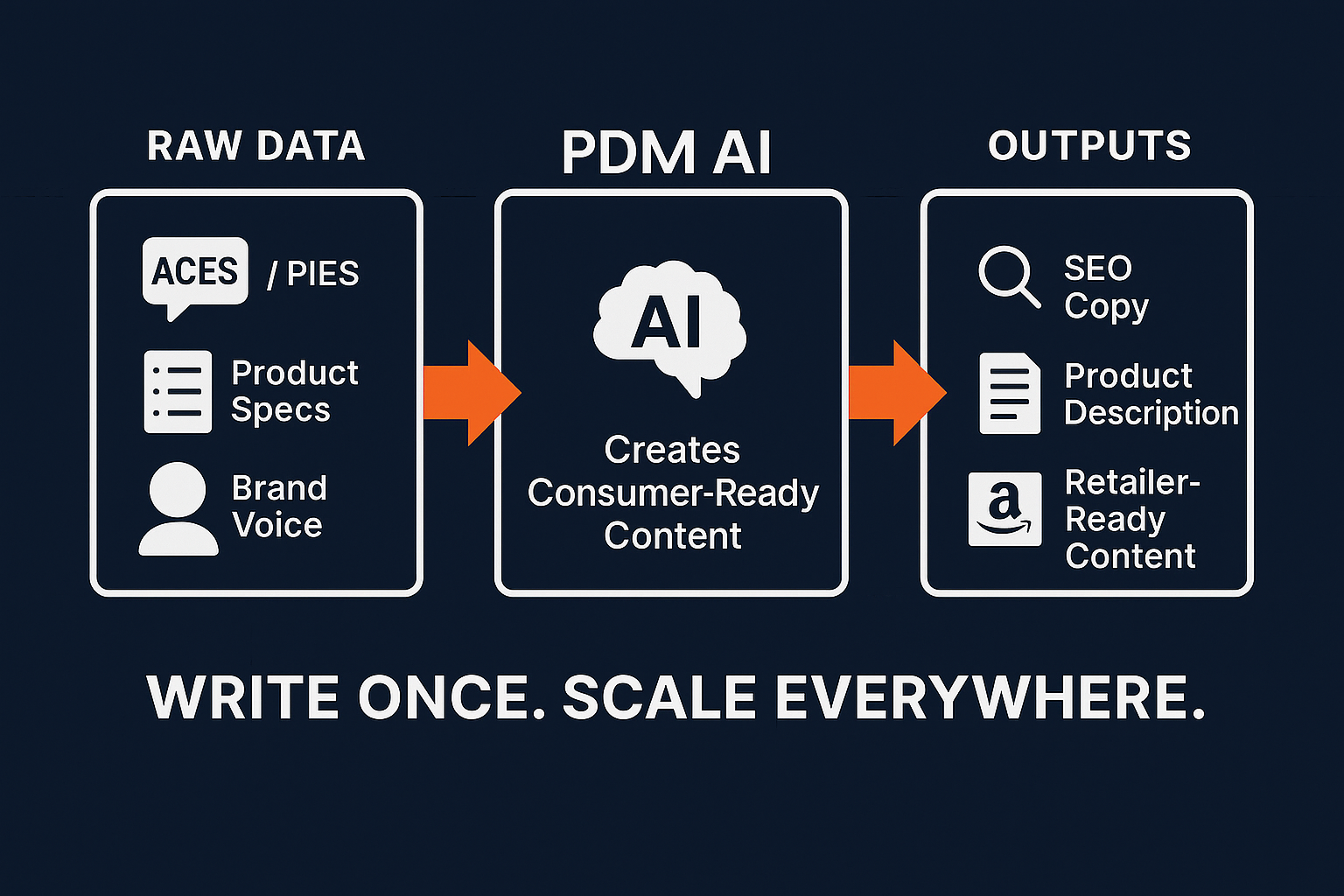If you’re still handing retailers spreadsheets packed with specs—or worse, PDFs with product sheets—you’re making it harder for them to sell your parts.
Technical data is essential, but it’s only half the story. Consumers don’t shop based on thread pitch and bore diameter. They want clear, benefits-driven descriptions that help them understand what a part does and why it matters.
That’s where most suppliers hit a wall. Creating that kind of content at scale takes time, resources, and often a dedicated team. But with the rise of AI-driven tools, there’s now a better way to deliver consumer-ready content—without redoing your entire catalog.
The Disconnect: Great Parts, Poor Descriptions
Suppliers are experts at building high-quality parts. But many still struggle to communicate that value online. The problem isn’t the part—it’s the presentation:
| Challenge | Impact on Retailer and Consumer |
| Raw spec sheets, no marketing copy | Retailers have to rewrite everything—or skip listing altogether |
| PDFs instead of structured data | Content becomes unusable for most eCommerce platforms |
| One-size-fits-all text | Lacks emotional appeal, SEO value, and consumer clarity |
| Manual copywriting | Too time-consuming to apply across thousands of SKUs |
Why It Matters More Than Ever
As consumers demand more from digital storefronts, retailers are under pressure to deliver faster, cleaner product listings. If your content isn’t plug-and-play ready—engaging, SEO-friendly, and structurally clean—it’s a friction point in the sales process.
That friction costs both you and your retail partners time and money.
The Solution: AI-Driven Content That Speaks to Shoppers
PDM AI for Content Creation solves the scale problem without compromising quality. Here’s how:
| Benefit | What It Means for Suppliers |
| Transforms specs into stories | Converts fitment and technical data into readable, benefit-led content |
| Built-in SEO optimization | Helps your product pages rank higher in search results |
| Works across your whole catalog | AI generates consistent descriptions across thousands of SKUs |
| Preserves your brand voice | Maintains tone and style to reinforce brand identity |
| Reduces manual work | Frees up your team to focus on strategy—not copy-pasting descriptions |
You configure your content style, generate descriptions with a click, and export them straight to your trading partners and eCommerce channels. No guesswork. No bottlenecks.
What Happens When You Scale the Right Way
Using AI doesn’t mean sacrificing quality for speed. It means scaling quality—giving every part in your catalog a voice that’s tuned for conversion, not just compliance.
The result? Retailers list your products faster. Shoppers trust your brand more. And your product pages start pulling their weight across every channel.
Let’s Get You Started
Tired of copy-pasting specs and hoping they’ll sell your products? We can help.
Talk to PDM Automotive and see how PDM AI can turn your catalog into a content engine that drives results.
Frequently Asked Questions About Consumer-Ready Content for Automotive Suppliers
What is consumer-ready content in the automotive aftermarket?
Consumer-ready content goes beyond specs to explain a product’s benefits in plain language. It makes listings easier to understand, more engaging, and optimized for search engines.
Why are raw specs a problem for eCommerce?
Raw specs alone don’t speak to the consumer’s needs. Without context or benefit-driven language, listings fail to convert—especially in competitive marketplaces.
How does PDM AI create consumer-friendly product descriptions?
PDM AI uses your structured product data as a foundation to generate marketing-focused, SEO-ready descriptions at scale. You control the tone, length, and format.
Can AI-generated content still reflect our brand voice?
Yes. PDM AI ensures brand voice consistency by allowing you to configure templates and tone preferences before generation—so every description feels authentic.
How do I share AI-generated content with retailers?
Once your content is created in PDM, it’s easy to export and distribute to retailers, marketplaces, and any other sales channels you use.



